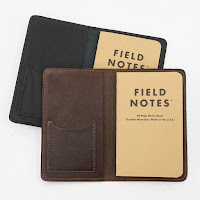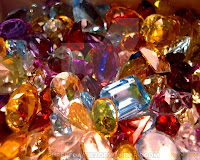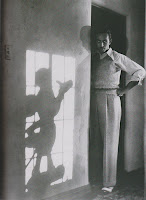What is with you and those notebooks?
 People make fun of me because I keep at least one pocket
notebook on my person at all times. Most times, it’s at least two, one in each
back pocket. And I have at least two pens with me, one blue, one black. The easy
answer to the question “Why?” is, “Hey, I’m a writer.”
People make fun of me because I keep at least one pocket
notebook on my person at all times. Most times, it’s at least two, one in each
back pocket. And I have at least two pens with me, one blue, one black. The easy
answer to the question “Why?” is, “Hey, I’m a writer.”
That usually gets one of those “Ohhhhh…” comments and a nod,
one of those nods like you get when you trip for no reason, but look back at
the ground for the non-existent object you trip over.
 Truth be told, I keep the notebooks because I constantly
have little ideas, bits of dialogue, and the like just pop into my head.
Driving around, I see things, people on the street, almost anything can throw
the switch on the proverbial “light bulb” of an idea, and I HATE having a
really good idea pop into my head and losing it three minutes later.
Truth be told, I keep the notebooks because I constantly
have little ideas, bits of dialogue, and the like just pop into my head.
Driving around, I see things, people on the street, almost anything can throw
the switch on the proverbial “light bulb” of an idea, and I HATE having a
really good idea pop into my head and losing it three minutes later.
I have two file folders in my desk drawer that are full of
napkins, receipts, back covers of old paperback books, you name it, if you can
write on it, I have at least one of them in those folders. I would buy
notebooks, mind you, but I never remembered to actually put them in my pocket.
Somewhere in the clutter of my writing room closet, there are probably boxes
full of pocket notebooks that have one page used and nothing else in them.
Look, there’s no shame in keeping notebooks, or even those
file folders full of assorted paper with ideas on them. Every writer seems to
have that desk drawer or file cabinet that has dozens of unfinished stories,
half-a-novels, opening paragraphs of works that petered out after those first
sentences. Some might tell you to throw all those things out, keep everything
fresh, never look back, pick your pithy saying. And that might be a good way
for some people to work.
I can’t, though.
Every morning, when I start my writing time, I spend an hour
or so just free writing. Think of it like unloading all the baggage so you can
restock the shelves. Just start writing, pure stream-of-consciousness, whatever
pops into your brain, put it on the paper. Type it onto the monitor screen. It
doesn’t have to be complete sentences – I mean, let’s face it. If you are
honest with yourself, nobody really thinks in complete sentences. But the point
is, just let the words fall out of your brain. Then, when your shelves are
empty, start filling them again with whatever project you are working on.
 But, instead of discarding that baggage, save it. Stash it
on your desktop or tuck the papers off to the side. When you are done writing
for the day, go back, and just read through all the things you filled those
pages with. You might be surprised to find that, while you thought you were
just getting rid of excess garbage, you uncovered a gem or two amidst the
rubbish. Those gems are the ones you save. You get enough gems, you have a
treasure.
But, instead of discarding that baggage, save it. Stash it
on your desktop or tuck the papers off to the side. When you are done writing
for the day, go back, and just read through all the things you filled those
pages with. You might be surprised to find that, while you thought you were
just getting rid of excess garbage, you uncovered a gem or two amidst the
rubbish. Those gems are the ones you save. You get enough gems, you have a
treasure. I keep a print of a photo of Walt Disney on one of the walls
of my office. It’s a familiar photo, one of a young Disney in a doorway, and on
the wall beside him is the shadow of his most famous idea, Mickey Mouse. The
phrase he loved to tell people the most – “We must never forget, it all started
with a mouse…” – is written in that beloved Disney font in one corner. I keep
that print where I can see it because it’s a true statement, one that inspires
me to keep those notebooks, those napkins and book covers and receipts, and all
those pages of free writing. All Disney started with was one very simple idea, a
cartoon of a mouse.
I keep a print of a photo of Walt Disney on one of the walls
of my office. It’s a familiar photo, one of a young Disney in a doorway, and on
the wall beside him is the shadow of his most famous idea, Mickey Mouse. The
phrase he loved to tell people the most – “We must never forget, it all started
with a mouse…” – is written in that beloved Disney font in one corner. I keep
that print where I can see it because it’s a true statement, one that inspires
me to keep those notebooks, those napkins and book covers and receipts, and all
those pages of free writing. All Disney started with was one very simple idea, a
cartoon of a mouse.
If you think one idea can’t change the course of your life,
your career, or even the way the world sees things, just think about that
mouse.
It was just one idea.
Comments
Memo to self, buy some notebooks.
I usually have a notebook to hand for each novel or novel series, and then of course there are the notebooks I buy because they look so nice and then can't write in them because they're too pretty.
I've tried electronic notepads etc but I don't find they are as conducive to creativity (using the word loosely) as the paper kind.